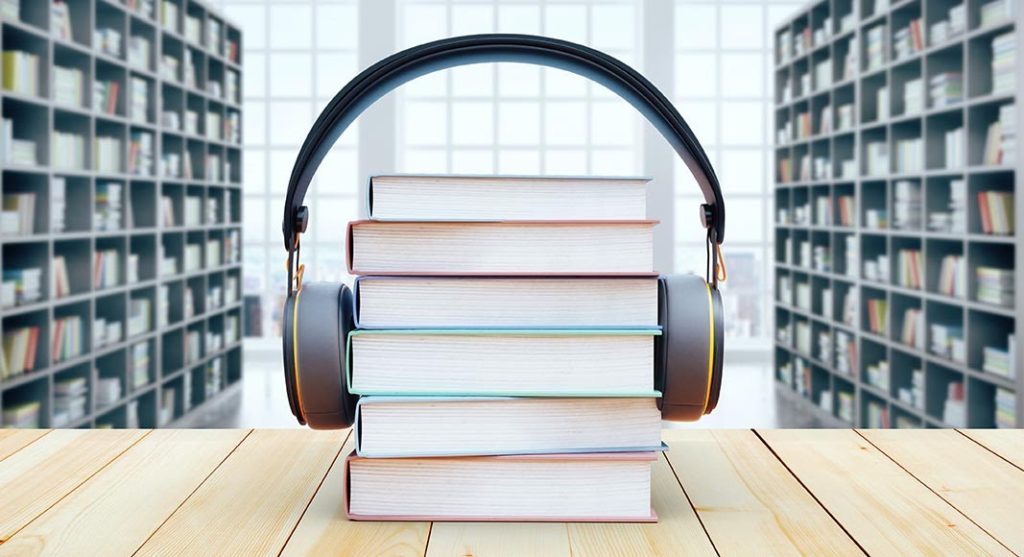Learn to Read, Audiobook Style

Image courtesy of voices.com
By Caroline Morris
I am nine years old, and I am jumping on a trampoline and reading Geronimo Stilton at the same time. I am fourteen years old, and I am dodging people in the school hallway with my torn up copy of Twilight in my face. I am twenty years old, and I am listening to the Pride and Prejudice audiobook as I take a walk during lockdown.
My entire life, I have been an avid reader; twenty-four hours a day, seven days a week. No matter the activity, if I could read at the same time, I did. I assure you, this trained me to have excellent peripheral vision.
But readers are a dying breed. Literary reading has been declining since the 1980s, and this drop-off has only worsened with the prevalence of electronic content.
Let me be clear: I am not bashing on enjoying modern content or electronics. I watched The Office twenty-five times before it was taken off of Netflix, a fact of which I am proud. But this change in media has its effects, whether we like it or not. Even I, a book addict, am not immune.
People are simply reading less books.
According to a survey done by the National Endowment for the Arts in 2002, this changes the way our minds and societies work.
“Reading a book requires a degree of active attention and engagement… By contrast, most electronic media such as television, recordings, and radio make fewer demands on their audiences, and often require no more than passive participation… [This fosters] shorter attention spans and accelerated gratification,” the survey reads.
This report is just one of many pieces of evidence that tells us reading is declining and that negative consequences will inevitably ensue. But what they do not tell us is how to fix it.
Starting to read or read again can be a brutal process. Plenty of people never had a love of reading fostered in them as children and may struggle as adults to pick up a book out of intimidation. There are other cases where you read a ton as a kid, but you stopped in high school. Now whenever you try to read it doesn’t feel like it used to and you never know what books to pick. Or maybe you’re an avid reader who has hit a slump.
Here is what everyone is forgetting: reading is a skill, and not always an easy one.
“[R]eading itself is a progressive skill that depends on years of education and practice,” reads the NEA survey.
Just as we all lose clarity on how to factor or how to identify molecules in chemistry, if we do not practice, the same happens with reading. But reading is so ubiquitous in society that struggling can feel shameful, despite how common this experience is.
So how do we fix it?
My answer: love and audiobooks.
Everyone loves stories. If you enjoy movies, TV shows, music, or talking with friends, you are drawn to stories being told. They are all different forms of the same pastime; reading is just another form.
So the first step to reading again is figuring out what kinds of stories you love. Look at the media you are taking in and try to find a common theme, or even go back to the books you loved as a kid. Nostalgia is a powerful tool.
The second step is audiobooks.
I was an audiobook hater for a while. My brain does not do well with auditory learning, so I was convinced that I would get constantly distracted and miss things. I was also afraid that certain literary practices would not be able to translate from the page to the ear.
Quarantine turned me into a convert. I, like everyone else, was constantly taking walks during lockdown to keep from going crazy. Eventually I got bored of just listening to music and my podcasts were not updating fast enough.
So I turned to audiobooks. I started out with Pride and Prejudice, because I had read it twice before and knew that even if I missed something I would never be entirely lost. That one audiobook reignited my love of reading that had slumped a bit in college and changed my entire perspective on listening to books.
Audiobooks are the perfect way to dive back into reading. Podcasts are more popular than ever these days. Many of us are already listening to stories being told only through our headphones, without screens. By using the same formats we already enjoy, we can stretch the reading muscles that have atrophied.
Once on the audiobook kick, I found it much easier to sit down and read a physical book because I had already been following along with a well-written, intellectually stimulating, long-form narrative. I also loved them as they were, because I could read while driving or working out without endangering any lives. Now I am back to reading constantly, but even when I burn out on books, I always have a story waiting for me in my back pocket.
In today’s age of digital media and the crush of quick content, audiobooks are the way to combat a society losing its literacy. They are the future of reading because they are the gateway to transition back to books.
Let’s just hope the narrators are good.





